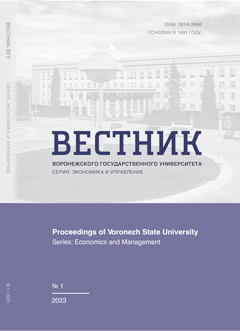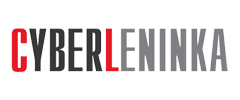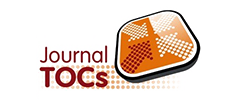
Этика научных публикаций
Журнал «Вестник ВГУ. Серия: Экономика и управление» придерживается общепринятых норм этики научных публикаций. Политика журнала «Вестник Воронежского государственного университета. Серия: Экономика и управление» в области публикационной этики опирается на следующие рекомендации и стандарты:
- Кодекс этики научных публикаций, подготовленный Комитетом по этике научных публикаций (Committee on Publication Ethics, COPE)
- Руководство по этике научных публикаций (Publishing Ethics Resource Kit, PERK) издательства Elsevier
- Принципы прозрачности и лучшие практики научного издания, совместно разработанные Committee on Publication Ethics (COPE), Directory of Open Access Journals (DOAJ), Open Access Scholarly Publishers Association (OASPA) и World Association of Medical Editors (WAME)
- Положения, принятые на 2-ой Всемирной конференции по вопросам соблюдения добросовестности научных исследований (Сингапур, 22-24 июля 2010 г.)
- Декларация Ассоциации научных редакторов и издателей (АНРИ) «Этические принципы научных публикаций»
- Нормы главы 70 «Авторское право» Гражданского кодекса Российской Федерации
1. Обязанности Главного редактора
1.1. Решение о публикации
Главный редактор научного журнала «Вестник Воронежского государственного университета. Серия: Экономика и управление» несет ответственность за принятие решения о публикации, в отдельных случаях разделяя ее с редакционной коллегией. В основе решения о публикации должны лежать достоверность рассматриваемой работы и ее научная значимость. Главный редактор должен руководствоваться принципами работы редколлегии журнала «Вестник Воронежского государственного университета. Серия: Экономика и управление» ориентируясь на действующие законодательные нормы в отношении ответственности за клевету и плагиат, соблюдения авторского права. Главный редактор имеет право советоваться с Рецензентами (или должностными лицами Издателя) при принятии решения о публикации.
1.2. Порядочность
Главный редактор должен оценивать интеллектуальное содержание рукописей вне зависимости от расы, пола, сексуальной ориентации, религиозных взглядов, происхождения, гражданства или политических предпочтений Авторов.
1.3. Конфиденциальность
Главный редактор (заместители главного редактора) и Редакционная коллегия журнала «Вестник Воронежского государственного университета. Серия: Экономика и управление» не должны раскрывать без веских причин информацию о принятой рукописи, сообщать какие-либо сведения посторонним лицам, за исключением Авторов, Рецензентов, научных консультантов и Издателя.
1.4. Политика неразглашения и конфликты интересов
1.4.1. Неопубликованные данные, полученные из представленных к рассмотрению рукописей, редакторам нельзя использовать в личных исследованиях без письменного согласия Авторов. Информация или идеи, полученные в ходе рецензирования, должны оставаться конфиденциальными и не использоваться с целью получения личной выгоды.
1.4.2. Главный редактор (заместитель главного редактора) должен взять самоотвод, не рассматривать рукопись и не сотрудничать с другими членами редколлегии, которые будут рассматривать работу в случае конфликта интересов вследствие конкурентных, совместных и других взаимодействий и отношений с Авторами, компаниями и другими организациями, связанными с материалами рукописи.
1.5. Надзор за достоверностью публикаций
Главный редактор, получивший убедительные доказательства того, что утверждения или выводы, представленные в публикации, ошибочны, должен сообщить об этом факте Издателю с целью скорейшего внесения изменений, изъятия публикации, опубликования заявления, выражения обеспокоенности или других действий, соответствующих ситуации.
2. Обязанности Рецензентов
2.1. Влияние на решения Редакционной коллегии
Рецензирование помогает Главному редактору принять решение о публикации и посредством соответствующего взаимодействия с Авторами повысить качество работы. Рецензирование – необходимое звено в научных коммуникациях – находится в основе научного подхода.
2.2. Исполнительность
Любой выбранный Рецензент, пришедший к выводу о недостатке квалификации для рассмотрения рукописи или не имеющий достаточно времени для быстрого выполнения работы, должен уведомить Главного редактора журнала «Вестник Воронежского государственного университета. Серия: Экономика и управление» и обратиться с просьбой, исключить его из процесса рецензирования соответствующей рукописи.
2.3. Конфиденциальность
Любая рукопись, полученная для рецензирования, должна рассматриваться как конфиденциальный документ. Представленную статью нельзя показывать и обсуждать с любыми лицами, не имеющими на то полномочий от Главного редактора.
2.4. Требования к рецензированию и объективность
Рецензент обязан давать объективную оценку. Персональная критика Автора неприемлема. Рецензентам следует аргументировать свое мнение.
2.5. Признание первоисточников
Рецензентам следует выявлять значимые опубликованные работы, соответствующие теме и не включенные в библиографию к рукописи. На любое утверждение (наблюдение, вывод или аргумент), опубликованное ранее, в рукописи должна быть соответствующая библиографическая ссылка. Рецензент должен также обращать внимание Главного редактора на обнаружение существенного сходства или совпадения между рассматриваемой рукописью и любой другой опубликованной работой, находящейся в сфере научной компетенции Рецензента.
2.6. Политика в отношении раскрытия конфликтов интересов
2.6.1 Неопубликованные данные, полученные из представленных к рассмотрению рукописей, рецензентам нельзя использовать в личных исследованиях без письменного согласия Автора. Информация или идеи, полученные в ходе рецензирования и связанные с возможными конкурентными преимуществами, должны оставаться конфиденциальными, их нельзя использовать с целью получения личной выгоды.
3. Обязанности Авторов
3.1. Требования к рукописям
3.1.1 Авторы оригинального исследования должны предоставлять достоверные результаты проделанной работы и объективное обсуждение значимости исследования. Данные, лежащие в основе работы, должны быть представлены без ошибок и искажений. Работа должна содержать достаточно деталей и библиографических ссылок. Ложные или заведомо ошибочные утверждения воспринимаются как неэтичное поведение и неприемлемы.
3.2. Оригинальность и плагиат
3.2.1. Авторы удостоверяют, что представлена полностью оригинальная работа и в случае использования работ или утверждений других Авторов должны предоставлять соответствующие библиографические ссылки или выдержки.
3.2.2. Плагиат представляет собой неэтичные действия и неприемлем. Плагиат может существовать во многих формах: от представления чужой работы как авторской до копирования или перефразирования существенных частей чужих работ (без указания авторства) и до заявления собственных прав на результаты чужих исследований.
3.2.3. Разрешение спорных вопросов, связанных с плагиатом Редакция журнала «Вестник Воронежского государственного университета. Серия: Экономика и управление» придерживается стандартов академической этики, защищает репутацию авторов и серьезно относится ко всем случаям плагиата. Обвинения в плагиате могут отразиться на карьере исследователя. При возникновении подобных ситуаций используется система процедур, позволяющих реагировать на возможные обвинения в плагиате.
3.2.4. В целях обеспечения объективности редакция тщательно исследует каждый случай и рассматривает аргументы всех заинтересованных сторон. Прежде чем предпринимать дальнейшие действия, редакция стремится получить максимально точную информацию у авторов спорной публикации или владельцев авторских прав и изучает ее. Решение редакции беспристрастно, объективно и не подвержено влиянию третьих сторон.
3.2.5. Редакция оставляет за собой право не реагировать на обвинения в плагиате, если обвинитель предоставляет недостоверную персональную информацию (например, представляется вымышленным именем), либо действует в неэтичной или угрожающей форме. Редакция не обязана обсуждать случаи предполагаемого плагиата с лицами, не имеющими к нему прямого отношения.
3.2.6. Авторские права защищены в соответствии с Гражданским кодексом Российской Федерации. Журнал заключает c автором (авторами) Лицензионный договор о распоряжении интеллектуальными правами.
3.3. Множественность, избыточность и одновременность публикаций.
3.3.1. Автор не должен публиковать как оригинальную публикацию рукопись, по большей части посвященную одному и тому же исследованию, более чем в одном журнале. Представление одной и той же рукописи одновременно более чем в один журнал воспринимается как неэтичное поведение и неприемлемо.
3.3.2. Автор не должен представлять на рассмотрение в другой журнал ранее опубликованную статью.
3.4. Признание первоисточников
Необходимо всегда признавать вклад других лиц. Авторы должны ссылаться на публикации, которые имеют значение для выполнения представленной работы. Данные, полученные частным образом, например, в ходе беседы, переписки или в процессе обсуждения с третьими сторонами, не должны быть использованы или представлены без письменного разрешения первоисточника. Информация, полученная из конфиденциальных источников (оценка рукописей, предоставление грантов и др.), не должна использоваться без письменного разрешения Авторов работы, имеющей отношение к конфиденциальным источникам.
3.5. Авторство публикации
3.5.1. Авторами публикации могут выступать только лица, которые внесли значительный вклад в формирование замысла работы, разработку, исполнение или интерпретацию представленного исследования. Все те, кто внес значительный вклад, должны быть обозначены как Соавторы. В тех случаях, когда участники исследования внесли существенный вклад по определенному направлению в исследовательском проекте, они должны быть указаны как лица, внесшие значительный вклад в данное исследование.
3.5.2. Автор несет ответственность за то, что все участники, внесшие существенный вклад в исследование, представлены как Соавторы, а те, кто не участвовал в исследовании, не указаны в качестве Соавторов, что все Соавторы видели и одобрили окончательную версию работы и согласились с представлением ее к публикации.
3.6. Политика раскрытия конфликтов интересов
Все Авторы обязаны раскрывать в своих рукописях финансовые или другие существующие конфликты интересов, которые могут быть восприняты как оказавшие влияние на результаты или выводы, представленные в работе.
3.7. Существенные ошибки в опубликованных работах
В случае обнаружения Автором существенных ошибок или неточностей в публикации, Автор должен сообщить об этом в редакцию журнала «Вестник Воронежского государственного университета. Серия: Экономика и управление» и взаимодействовать с ней с целью скорейшего изъятия публикации или исправления ошибок. Если в редакции получены сведения от третьей стороны о том, что публикация содержит существенные ошибки, Автор обязан изъять работу или исправить ошибки в максимально короткие сроки.
4. Обязанности Издателя
4.1. Издатель (Федеральное государственное бюджетное образовательное учреждение высшего образования “Воронежский государственный университет”) должен следовать принципам и процедурам, способствующим исполнению этических обязанностей Редакторами, Рецензентами и Авторами в соответствии с настоящими рекомендациями. Издатель должен быть уверен, что на принимаемые решения не влияют никакие заинтересованности.
4.2. Издатель должен оказывать финансовую и юридическую поддержку редакции журнала «Вестник Воронежского государственного университета. Серия: Экономика и управление» в рассмотрении претензий к этическим аспектам публикуемых материалов и способствовать взаимодействию с другими журналами и/или Издательствами.
4.3. Издатель должен обеспечить соответствующую специализированную юридическую поддержку (заключение или консультирование) в случае необходимости.
4.4. Издатель поддерживает научные коммуникации, финансирует процесс редакционно-издательской подготовки и выпуска издания в свет, контролирует редакционно-издательский процесс, а также несет ответственность за соблюдение современных требований и рекомендаций.
4.5. Издатель обязан контролировать достоверность научной информации и добросовестность научных исследований с точки зрения этических аспектов, изложенных в настоящем документе.
5. Отзыв (ретракция) статей
5.1. При рассмотрении ситуаций, связанных с отзывом (ретракцией) статей, редакция журнала «Вестник Воронежского государственного университета. Серия: Экономика и управление» руководствуются рекомендациями Комитета по публикационной этике (COPE Retraction Guidelines) и Совета по этике АНРИ (Правила отзыва (ретракции / ретрагирования) статьи от публикации).
5.2. Основная цель ретракции – исправление опубликованной информации и предупреждение других авторов и читателей о неправомерности использования в своих исследованиях результатов ретрагированной статьи, обеспечение целостности добросовестных исследований, а также защита репутации журнала, стремящегося сохранять доверие авторов и читателей к качеству публикуемых работ.
5.3. Основания для отзыва статьи:
- обнаружение в опубликованной статье серьезных ошибок и/или выявление фактов фальсификации данных, ставящих под сомнение ее научную ценность
- дублирование публикации в нескольких изданиях
- обнаружение некорректных заимствований (плагиата) в опубликованной статье
5.4. Ретракция не зависит от срока давности публикации статьи, в которой обнаружены нарушения. Статья может быть отозвана по официальному обращению авторов, мотивированно объяснивших причину своего решения, а также по инициативе редакции журнала на основании собственной экспертизы. В последнем случае автору (или ведущему автору в составе коллектива авторов) направляется официальное письмо с информацией о причинах отзыва статьи.
5.5. После отзыва статья остается на сайте журнала в составе соответствующего выпуска и сохраняет идентификатор DOI, но помечается как отозванная. Такая же пометка делается в оглавлении выпуска. PDF-версия статьи заменяется идентичной версией с водяным знаком, указывающим на каждой странице, что статья отозвана.
5.6. Редакция публикует заявление об отзыве статьи с указанием причин и даты ретракции на официальном сайте журнала. Информация об отзыве статьи и ее PDF-версия с соответствующей маркировкой направляются в библиографические базы, в которые включен журнал. Информация также передается в Совет по этике научных публикаций АНРИ для внесения в Единую базу ретрагированных статей.
Принципы прозрачности научного издания
Принципы прозрачности и лучшие практики научного издания, которым следует редакция журнала Вестник Воронежского государственного университета. Серия: Экономика и управление:
- Веб-сайт: журнал имеет современный дизайн с удобной навигацией. Веб-сайт журнала соответствует высоким этическим и профессиональным стандартам. Представлена Информация о целях и тематическом охвате журнала, о критериях для отбора статей. ISSN четко отображен на веб-сайте.
- Название журнала: журнал имеет уникальное название.
- Процесс рецензирования: все поступающие статьи проходят обязательное анонимное рецензирование. Редакционная политика и процесс рецензирования представлены на веб-сайте журнала.
- Право собственности и управление: информация о праве собственности и управления журналом представлена на веб-сайте журнала и веб-сайте учредителя.
- Руководящий орган: члены редакционной коллегии являются признанными экспертами в предметных областях, входящих в сферу деятельности журнала. На веб-сайте журнала представлены их полные имена и места работы.
- Редакция/контактная информация: на веб-сайте журнала представлены полные имена и места работы редакторов журнала, а также контактная информация редакции, включая полный адрес.
- Авторское право и лицензирование: политика в отношении авторского права указана на веб-сайте журнала. Имя правообладателя и условия лицензирования указываются во всех опубликованных статьях.
- Авторские сборы: информация об авторских сборах представлена на странице 'О журнале'.
- Обвинения в неправомерном проведении исследований: издатель и редакторы принимают разумные меры для выявления и предотвращения публикации статей, в которых имеет место неправомерное проведение исследований, включающее, но оне ограничивающееся плагиатом, неправомерным цитированием, манипуляциями, фальсификацией/фабрикацией данных.
- Этика публикаций: основные положения политику в отношении этики публикаций представлены на веб-сайте журнала.
- График издания: периодичность выхода выпусков журнала в свет представлена на странице 'О журнале'.
- Доступ: информация и политике доступа к опубликованным материалам представлена на странице 'О журнале'.
- Архивирование: сервисы архивирования, используемые редакцией журнала приведены на странице 'О журнале'.
- Источники финансирования: основным источником финансирования публикаций являются средства учредителя.
- Реклама: рекламная политика журнала представлена на странице 'О журнале'.
- Прямой маркетинг: деятельность по прямому маркетингу, включая сбор рукописей, осуществляемая от имени журнала, является целенаправленной, уместной и ненавязчивой.






















